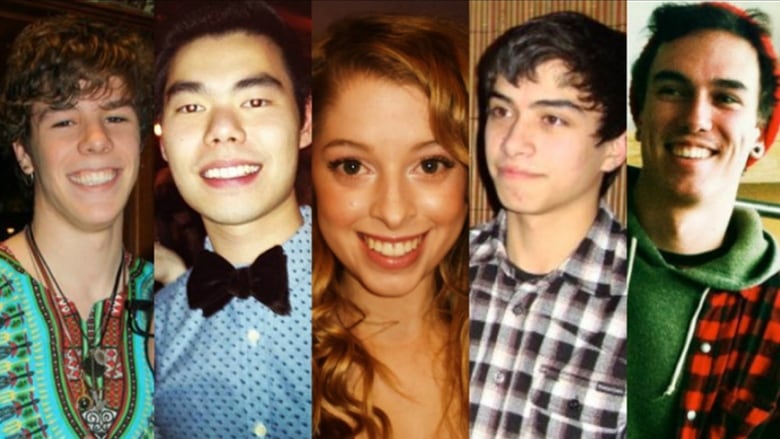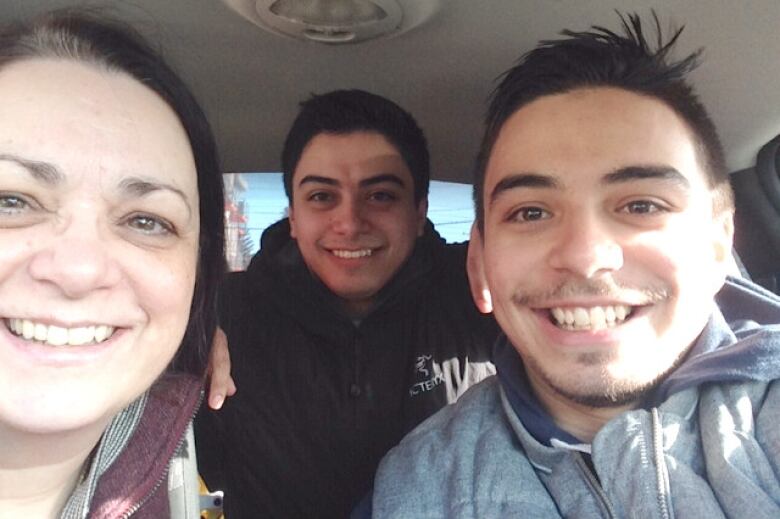'The trauma is always nearby': Victims' families struggle through Matthew de Grood's mental health hearing
Lawrence Hong, Joshua Hunter, Kaitlin Perras, Zackariah Rathwell, Jordan Segura were killed at house party

The families of Matthew de Grood's five victims say they are resentful andangryat having to attend hearings that "derail the healing."
On Wednesday, they were in a Calgary courtroom for the second progress report in less than a year on the mental health of the man who killed their loved ones while suffering a psychotic break.
"It's almost as if a scab had formed over the pain ... and then this review came, and that scab was torn off," said Rhonda-Lee Rathwell whose sonZackariahRathwellwas stabbed to death by de Grood three years ago.
On April 15, 2014, at a party celebrating the end of university classes, deGroodfatally stabbed five young people; Rathwell, 21, Lawrence Hong, 27,Joshua Hunter, 23,KaitlinPerras, 23,andJordanSegura, 22.
Originally charged with five counts of first-degree murder, deGroodwas found not criminally responsible (NCR) after a two-week trial in May 2016 because the judge ruled he wasin a psychotic state at the time of the killings suffering schizophrenia symptoms and could not understand that his actions were morally wrong.

GreggPerrassaid he was"appalled to be here today" so close to the three-year anniversary of his daughter's death and less than 10 months since the last review.
"The trauma is always nearby," saidPerras."Our nightmare continues each and every day ... the nightmare is a real-life horror."
In between their victim impact statements, the dozens of family members crammed into the rows of seatsheld onto each other, passed boxes oftissuesand stood up to hug each tearful mother, father or sibling who madetheir way back from the witness box.
'No one cares'
Perras' mother Shannon Miller described the "hundreds of triggers that every day punch me in my soul."
In her statement,Segura'smother Patty expressed anger.
"The justice system has made me feel completely invisible," she said. "No one is listening."

Nightmares, feelings of hopelessness and grief mark theHongs' nights and days.
"I'm still suffering the same grief, the same pain, the same loss," saidLorenzoHong. [I am] acting OK on the outside but wailing, screaming, crying on the inside because no one cares about what happened to our children."
Werewolves and vampires
Throughout the Court of Queen's Bench murder trial, Justice Eric Maklin heard evidence de Groodbelieved he had to kill or be killed because he was at war with vampires and werewolves.
The University of Calgary psychology graduate sent ominous messagesin the hours before the killings and told friends at the party he thought the end of the world was imminent.
After the trial, deGroodwas sent to the Southern Alberta Forensic Psychiatry Centre, a secure psychiatric facility, for treatmentrather than a prison.

This is the second annual review conducted by a board comprised of a judge,lawyer, forensic psychiatrist and a member of the public. The first took place in July 2016.
Doctors have diagnosed de Grood with schizophrenia, but he is considered to be in "full remission" in the hospital setting and has been symptom free since July 2014.
Dr.SergioSantana said de Grood is also showing symptoms of post-traumatic stress disorder and is "fragile."
Families want high-risk NCR designation
Barclay Hunter doesn't want to see his son's killer thrown in jail. He understands that's not the right place for the mentally ill young man, but says the "extreme and heinous" killings warrant something more and shouldn't be a part of a "one size fits all approach."
He'd like to see de Grood slapped with a high-risk NCR designation.
It's one option on the table.Any time before an absolute discharge, the Crown can seek the designation, a change in legislation that took effect in 2014 as part of the federal Conservatives' tough-on-crime initiative would meandeGroodcould go up to three years between hearings.
Hunter knows, from the hours he has spent researching Canada's laws surrounding NCR patients, thatthe high risk designation relates to someone's risk to re-offend, notthe level of violence involved in the offence.
But Hunter believesthe latter should be taken into account.
"I think that he needs to be treated fairly and humanely, but the concept that he should be released and reintegrated into society after doing this based on some risk management or assessment process seems crazy to me," he said.
After hearing two days worth of evidence, there are three options on the table for the board: continueddetention, a conditional discharge or an absolute discharge.
Bothde Grood's lawyer and Santana sayit's too early to consider a discharge of any kind.
De Grood a 'model patient'
So far, de Grood has been allowed to use the internet and spend time outdoors in a fenced area. His treatment team is asking the board to allowde Groodtotake escorted walks with staff in an unsecured area of the hospital. Eventually he would be allowed to take the outings on his own.
The board has reserved its decision on whether to allow de Groodthe new privilege.
"He has been described in the reports ... as a model patient," said Fay.

Santana said de Groodhas insight into his illness, cooperates in programs and engages with all aspects of histreatment.
"He's not a criminal, he is not a murderer," said Fay. "He killed five people while in the throes of a severe mental illness which prevented him from discriminating between reality and fantasy."
De Grood was given the opportunity to address the board and Fay read his statement aloud.
"It pains me greatly to hear what the families of the victims are going through," wrote de Grood. "I hope they can understand that I am very sorry.
"I would have sought treatment if I knew something was wrong but I didn't know."
- MORE CALGARY NEWS|Firefighters douse blaze at vehicle salvage yard
- MORE CALGARY NEWS|Man linked to Calgary's jihadi cluster has been in Algerian jail for nearly a year












_(720p).jpg)


 OFFICIAL HD MUSIC VIDEO.jpg)
.jpg)



























































































